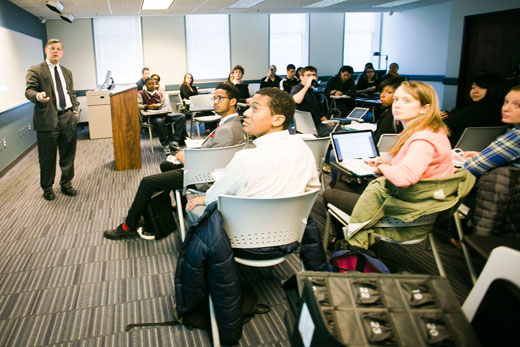Political science professor Michael Rich's undergraduate course on public policy process has collided with U.S. government reality this semester.
With sequestration — $85 billion in automatic cuts in the U.S. government budget scheduled to go into effect March 1 — looming, Rich assigned his 29 students the personas and party affiliations of various members of the U.S. Senate. He asked them to identify and explain how they would "make some progress in whacking away at the projected $2.3 trillion deficit the federal government is expected to accumulate over the next 10 years if no changes are made to current policies."
"This exercise exposes students to the challenges we face in bringing the deficit under control, to see the range of options, see the number of choices that have to be made," Rich said.
Rich said this simulation, developed several years ago by the Concord Coalition, a national, nonpartisan grassroots group that advocates for "generationally responsible fiscal policy," injects energy and enthusiasm into a relatively dry subject, giving students a far more sophisticated understanding and drawing them into greater depths of analysis.
On a recent Tuesday, student groups assembled at the front of their Tarbutton Hall classroom to face their classmates in a Senate seating arrangement and present their "bipartisan" ideas on which spending to hold and which to fold. They introduced themselves by names familiar from the media — John McCain (played by student Alfred Artis), Dianne Feinstein (Sonam Vashi), and Saxby Chambliss (Julia Kortrey), who added as an aside that "he" was retiring from the Senate because of his frustration over the intransigence toward getting a budget deal.
Rich said students are far more pragmatic about what has to be done to bring the deficit under control. "The exercise certainly opened students' eyes to the number of choices out there — the challenges of trying to do this in our political system."
"Today, they certainly seemed conducive to upping the revenue," he said after the class, referring to the national push-pull of raising revenue versus cutting programs. "College students are more supportive of spending."
Results of the compromises and negotiations showed the students' priorities.
NIH funding and other priorities
Emory students strongly back continuing funding levels for the National Institutes of Health, an important source of research funding for universities. Said Tara Knapp, a student playing New Jersey Sen. Frank Lautenberg, "This is a big one. Eighty percent of the NIH budget goes to improving health care. Health care is 24 percent of the national budget."
The students playing Democratic senators, in particular, resisted proposed changes to Medicare and Social Security such as gradually increasing the age of eligibility to each, arguing that such changes merely raise the costs of other government programs by moving the needs from one to the other, thus defeating the rationale for the move.
Support for or against the Affordable Health Care Act, aka Obamacare, and adding a public option for health insurance fell along party lines. One GOP "senator," Devon Hooper, cited mandated health care as "unfair" because unlike car insurance, for example, which is a choice, "being alive isn't optional."
There was little interest in continuing foreign military engagement — in fact, reducing it was seen as a source of revenue to use for other programs — but there was a great deal of interest in homeland security, including anti-terrorism programs and airport security.
A couple of the designated Republicans spoke out in favor of the missile defense program, one noting that he lived in the western United States, with a closer geographic proximity to the rogue state of North Korea and the potentially militarily-threatening China.
The students were protective of military personnel and their current level of benefits. However, they were willing to cut adjustments in pay for federal workers.
A revenue-raiser that got support or at least didn't draw protest was increasing the level of income at which Social Security is taxed.
One group came out strongly in favor of keeping the one dollar bill, as opposed to going to one dollar coins, an issue that seems to have a select constituency. "It would not make a difference" in reducing the deficit and it is "a symbol of U.S. monetary strength," said one student.
The Republicans got their licks in by supporting the continuation of tax subsidies for the oil and gas industry and opposing taxing corporations.
As Senate Minority leader "John McCain" noted in his closing remarks: "We're not getting what we want — either side, and that is what drives our votes."
A balanced approach to deficit reduction
In the class that met following the presentations, the student "senators" cast ballots and passed a budget deficit reduction strategy that eliminated nearly the entire $2.3 trillion projected cumulative federal deficit over the next 10 years.
Their strategy, Rich noted, rested on a balanced approach that included a mix of:
• spending cuts ($1.75 trillion)
• new revenues ($1.3 trillion)
• new spending ($778 billion).
"Among the 41 policy options considered as part of the exercise, the largest majority recorded was a 26-1 vote against limiting health care benefits for military retirees and their dependents," he said.
"The most closely contested votes were in the area of health care, Social Security, and related entitlement programs," Rich said. The class voted overwhelmingly to increase the maximum taxable earnings cap for the Social Security payroll tax.
Phil Smith, a director of the Concord Coalition, spoke to the students at the class following the vote.
Smith applauded the students for their balanced approach to deficit reduction. He encouraged them to share what they learned from the exercise with their peers as well as to speak out on these issues on behalf of the nation’s young adults, a group Smith noted will be deeply affected by the choices under consideration in Washington.

